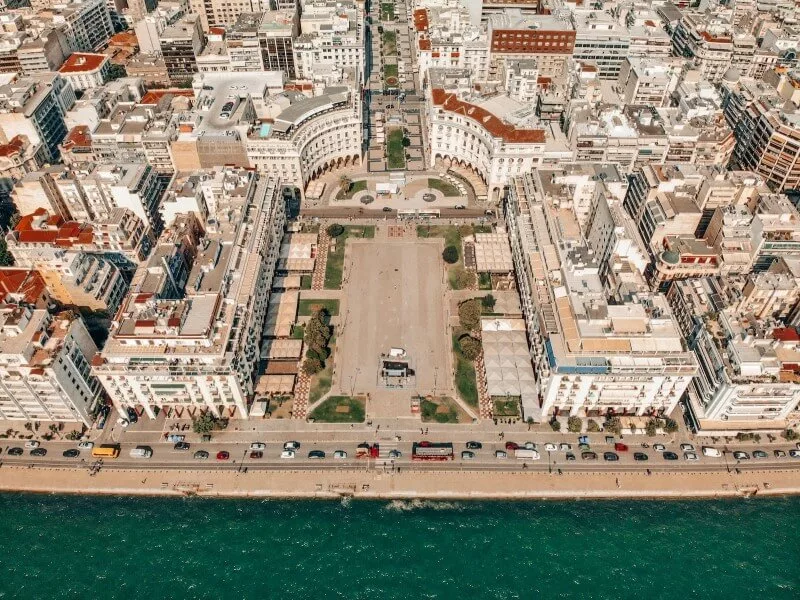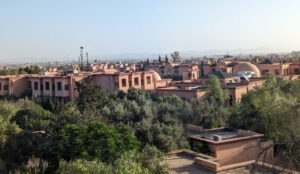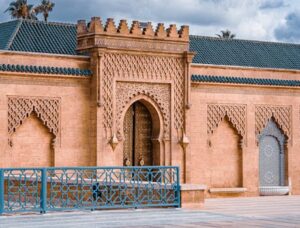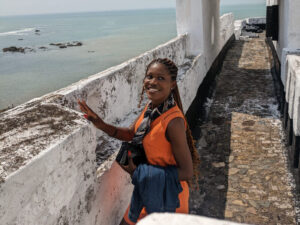
Let’s talk about Thessaloniki- of the letter of St. Paul to the Thessalonians- and what living in Thessaloniki is like
Thessaloniki is a captivating city, full of life and charm. It is where living, learning, and thriving intertwine harmoniously. Whether you’re a student, a professional, or an tourist in search of your next travel destination, Thessaloniki is worth exploring.
In this article, I’ll shine light on the fine details that makes this city what it is, and the upside and downsides to living in Thessaloniki. But before that, let me tell you …
What you probably didn’t know about Thessaloniki
Thessaloniki is believed to have its origins dating all the way back to 315 BC when it was built by King Cassander of Macedon for his wife, Thessalonike (sister of Alexander the Great). The city is a cultural melting pot that is historically shaped by the influences of the Roman, Byzantine, and Ottoman empires.
We see evidence of the influence of these empires in some of Thessaloniki’s most notable landmarks and monuments such as the Roman Arch of Galerius, the Monument of Rotonda, the Church of Saint Demetrius, the Medieval Castle, the Ancient Agora of Thessaloniki, Vlatadon Monastery, Museum of Byzantine Culture, and the White Tower.
Today, this city of around one million residents serves as the capital of Central Macedonia.
As Greece’s second-largest city, Thessaloniki plays a vital role in the nation’s economy. Its strategic location, diverse industries, and developing infrastructure make it an economic hub. The city offers a broad range of career opportunities across sectors like agriculture, manufacturing, shipping, education, and tourism, contributing to a dynamic job market.
Pros and cons of living in Thessaloniki
As with any other city, there are advantages and disadvantages of living in Thessaloniki. See some of them below.
| S/N | Pros | Cons |
| 1. | The people are welcoming | Language barrier |
| 2. | Healthy lifestyle | Limited income opportunities, especially for international students |
| 3. | Rich culture & amazing food | Difficulty in connecting with an African community |
| 4. | Historic site | Poor collaboration of Greeks with internationals |
| 5. | Great night life | Unfavourable business environment especially for small businesses. |
| 6. | Nice weather | The public sector leaves a lot to be desired |
| 7. | Opportunity to explore other countries without needing a visa |
Pros of living in Thessaloniki
- The people
Thessalonians are warm and welcoming people. They are known for their genuine warmth and hospitality. This is a notable advantage because if you visit a place where the locals aren’t welcoming, you won’t be safe.
- Lifestyle
One of the things I love about Greece, not just Thessaloniki, is their χαλαρά (halara) lifestyle. They do things with an unhurried pace and try to enjoy life by savouring each moment, finding beauty in the simplest things. This could have its cons as well, but in a world where people are always rushing and don’t live in the moment, it is great to live in an environment that’s slow-paced because it gives a deep sense of calm and inner peace.
- Rich culture, amazing food
Generally, Greece is a place where traditions and their accompaniments are cherished and upheld with great reverence. The Greeks make it a point of duty to celebrate their cultural festivals. From Agios Dimitrios to Tsiknopempti, to the lively plate-smashing festivities and solemn Easter celebrations.
When it comes to food, Thessaloniki offers culinary experience like no other. Their cuisines are influenced by different factors such as their geography, ancient traditions, neighbouring countries, the empires that ruled them in the past and tourists.
While pasta dishes are common, Thessaloniki has a variety of unique dishes, such as savory pies (like Tiropita, Bougatsa etc), souvlaki, falafel, and the iconic gyro (my favorite😋).
- Historic sites/remains.
Living in Thessaloniki offers the unique advantage of being surrounded by beautifully crafted and preserved historic sites and remnants of civilizations that thrived here long before our time. This enriching experience allows you to connect with the legacy of those who walked these ancient streets centuries ago, offering a profound appreciation for the historical narratives on the artistry and technological marvels you most likely encounter when reading books and watching movies.
- Great nightlife
The city comes alive after dark with vibrant clubs, bars, and restaurants to explore. Under the twinkling stars and calm breeze from the beaches in Thessaloniki, you’ll find both locals and expats, keeping the city awake year-round.
- Nice weather
Residing in Thessaloniki is a sun-seeker’s delight. The city’s climate provides over 200 sun-kissed days- a stark contrast to many European counterparts plagued by a surplus of cold, grey days. It doesn’t get too hot in summer, neither does it get too cold in winter. If you are visiting or relocating from a country with a warm climate like I did, you’d surely appreciate the weather in Thessaloniki even better.
- Access to other countries
Greece is a Schengen country. If you have a visa or permit to live in Greece, it automatically means that you can visa-free access other countries in the Schengen area.
You may be interested in: How to get Schengen visa from the UK.
Cons of living in Thessaloniki
- Language barrier
One potential drawback of living in Thessaloniki is the limited English proficiency among locals, making communication challenging, especially for short-term residents. Learning Greek is advisable for a richer experience, even though it’s an intriguing yet, somewhat complex language. Embracing the language can significantly enhance your experience during your time here.
- Limited income opportunities for students
Visa and residence permit limitations hinder students (especially those in private universities) from accessing work and income-generating avenues in Greece. This financial constraint leaves them reliant on personal savings or family support, which can be challenging and limiting for many students.
- Difficulty in connecting with an African community
Another notable downside is the challenge of connecting with the African community in Thessaloniki compared with Athens. Unfortunately, the absence of an active African community, both physically and on social media, makes it difficult to tap into potential events or opportunities. This issue requires attention and improvement for a more inclusive and connected living experience.
- Lack of collaboration
There is a low collaborative spirit among the youth- a sentiment shared by both Greeks and internationals. However, this general lack of openness to collaboration is not limited to the younger generation. It seems to be rather deeply rooted in Greek culture. Such reluctance to work together hinders the development of strong relationships that could be beneficial in business and various other endeavours. This is probably also influenced by the point below.
- Unfavourable business environment
Self-employed individuals and small businesses are greatly affected by red-tapism, lack of financial assistance, unnecessary imposed expenses, amongst other challenges. If your plan is to come to Thessaloniki (or any other place in Greece) to start a business, it is important that you are aware that factors like this can negatively affect your business, so you can plan appropriately.
- The public sector leaves a lot to be desired.
It’s common to find applications or requests that should ideally take days to resolve or fulfil stretch into weeks and months because of how not-quite-organized the public sector service in Greece is.
Read also: What is living in Leeds like?
Is it Expensive to Live in Thessaloniki?
Cost of living in Thessaloniki is quite reasonable. The primary cost considerations revolve around housing, feeding and transportation. For a decent apartment, you can expect to pay anywhere from 300 to 500 euros monthly, with variations based on your preferences. This range often strikes a balance between affordability and quality.
When it comes to food, Thessaloniki offers both affordability and quality, particularly if you enjoy cooking at home. Your monthly food expenses, when preparing your meals, could hover around 100 to 200 euros, contingent on your dining choices. Dining out frequently will, of course, increase these costs, with your expenditures influenced by the venues you select.
In terms of transportation, public transit in Thessaloniki remains notably budget-friendly, primarily relying on buses. A standard bus ticket typically costs around 1 euro, with discounted rates for students, making it a cost-effective choice for getting around the city.
As a student, what is living in Thessaloniki like?
Living in Thessaloniki as a student has been an exhilarating adventure. This vibrant city, home to the famous Aristotle University of Thessaloniki and an American private school, offers a dynamic and diverse learning environment.
Interacting with people from various countries and backgrounds and engaging in extracurricular activities like trade fairs, seminars, and EU-funded programs has broadened my horizons and enriched my study experience. Also, you can easily visit other choice nearby locations or cities like Chalkidiki, Meteora, Peloponnese etc. What truly stands out for me in Thessaloniki is the electrifying nightlife and the unique sports culture. Watching football matches here is unlike any other place in Europe. The intense rivalry among fans, the visual spectacle, and the passionate chants create an unforgettable and sometimes awe-inspiring atmosphere. Thessaloniki has truly been a captivating journey of learning and exploration for me.
Read also: What is living in Greenhithe like?
Frequently asked questions
Is Thessaloniki a nice place to live?
With its kind and friendly natives, diverse neighbour hoods, and eclectic culinary, Thessaloniki makes for a nice place to live. Moreover, it’s a hub of knowledge and education, as it is home to prestigious institutions.
What is the quality of life in Thessaloniki?
If I were to consider only the quality of education, environment, housing, quality of food, climate, and social life in this city, I would have said that the quality of life in Thessaloniki is excellent. But the healthcare system, transportation, employment rate/ lack of many economic opportunities puts a dent to the quality of life in Thessaloniki. But, is any city without its cons? Moreover, there is no
Do people speak English in Thessaloniki?
Yes, people speak English in Thessaloniki. However, Greek is the more popular language there. That’s why I earlier said that it will help to learn Greek.
Is it safe to walk in Thessaloniki at night?
It is safe to walk in Thessaloniki at night. But when walking at night, please exercise the necessary precautions. Walk in groups, walk in well-lit areas, don’t walk around with bulk cash or valuable properties and if you must don’t let people know, avoid lonely areas.
Is Thessaloniki good for expats?
Depending on the expat’s reason for coming to Thessaloniki. If it’s for studies or tourism, Thessaloniki is a good destination. But if you are coming to start a business, given the cons earlier discussed, Thessaloniki may not be a great choice.
Thessaloniki crime rate
Crime rate in Thessaloniki is relatively low. However, since there’s no such thing as being too careful, it is advisable to keep your valuables someone safe and secure, lock your doors and windows and be security conscious.
What are the areas to avoid in Thessaloniki?
Areas around the railway station and Dendropotamos are not considered to be totally safe, especially at night.
Can you swim in Thessaloniki beaches?
Yes, you can. Some of the beaches in Thessaloniki have designated swimming areas. Keep within those areas when swimming.
Conclusion
In summary, I’d say that living in Thessaloniki means embracing a unique blend of history, culture, and modernity in a dynamic Mediterranean city. If you’re seeking an extraordinary place to call home, Thessaloniki should be on the forefront of your choices, especially if you yearn for a historic city that breathes calmness, offers exhilarating experiences after dark, boasts an array of shopping delights, and exceptional cuisine.
If you ever visit Thessaloniki, add a visit to the White Tower to your itinerary. The tower which was initially built as part of the city’s defensive wall has since been converted to a museum. It has an underground exhibition space which you’ll find insightful as the historical artifacts, art works, and catacombs from way back displayed there provides a window into the city’s past.
Many thanks to Simon Edegbo for contributing to this piece.






